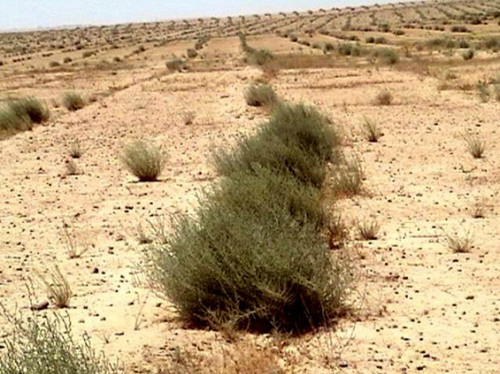
DAMASCUS (ST)- The General Commission for the Management , Development and the Protection of the Badia (desert) works on the implementation of important projects aimed to raise the efficiency of the economic and sustainable use to the Badia resources and improve the natural vegetation and pasture management through the development of open grasslands and its protection, especially in flood sites and rehabilitation of degraded sites.
Director General of the Commission, eng. Ali Hammoud, confirmed that his authority is working on the resettlement of extinct and endangered species, creating sanctuaries and gene banks, restoring the plant life, developing of the eco-tourism of the Badia and preserving the cultural heritage of the Badia.
“Nine environmental preserves were established of a total area estimated at 136,957 hectares and 59 protected pastorals were created at a total area estimated at 785,894 hectares to improve vegetation in the Badia in addition to the establishment of 13 pastoral nurseries and 10 centers for multiplication of seeds to be a supporter to the livestock in the Badia in coperation with the Ministry of Agriculture and international organizations,” Hammoud pointed out.
Hammoud clarified that samplings of plant seeds from different locations in the Badia had been completed and has grown in pastoral nurseries for breeding, bringing the number of plant species collected from those sites 70 species, a manual field also has been prepared which includes 63 species of medicinal plants, and the branches of the Commission were provided recently with the seeds of 50 species of different medicinal and aromatic plants to be bred.
It was also agreed with ACSAD to apply a joint experiment in one of the Badia sites for the rehabilitation of a deteriorating pastoral site on this system during this period and planting oases of palm around the wells of the Badia due to importance of this tree and the suitable environment of the Badia and encouraging local people to grow palm trees to give an aesthetic landscape.
The authority is working to make pools and dig holes to store water in the desert in cooperation with the Remote Sensing Association in order to benefit from the rain and storm water and providefor watering livestock, bringing the number excavations storage 36-hole in addition the drilling, renovating and equipping the wells in the Badia estimated at 324 wells.
Hammoud pointed out that the coordination is underway with the Planning and International Cooperation Association to ensure the necessary funding for a project to manufacture dairy units in the desert, along with the completion of the studies on camels, oryx, ostriches and preparing a census of livestock ,the establishment of a network of camel breeders and providing health care for the herds of sheep in cooperation with the ministry.
In the field of development of infrastructure in the Badia, the General Commission supplied Wadi Al Heil village with a water which lacks the network of drinking water though it is a center for sheep breeders in the Syrian desert and 9 stations for water desalination were invested and run, including 3 stations in the Badia of Al Hasaka, pointing out that all stations are ready to distribute water to the surrounding local communities as the number of households benefiting from each station at least 800 families with and the capacity of each station estimated at 100 cubic meters per day.
SH. KH.

